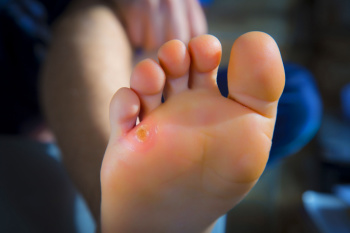North Andover (978) 686-7623
Tewksbury (978) 640-1010
Different Types of Corns
 Corns are thickened areas of skin, usually on the toes or soles of the feet, that develop in response to pressure or friction. There are several different types of corns, each with its own distinct causes. Hard corns form on top of the toes or on bony areas due to repeated pressure or friction from improper footwear. In addition, foot deformities like bunions or hammertoes can contribute to corn formation that results from rubbing against the inside of a shoe. Soft corns commonly occur between the toes where the skin is moist and are often caused by friction from adjacent toes rubbing against each other. Seed corns are tiny corns that form in regions of the foot subjected to consistent weight-bearing. They are believed to be caused by dry skin or deformed sweat ducts. Regular exfoliation and moisturizing of the feet can help prevent dry skin and reduce the risk of seed corns. By participating in proper foot care practices, individuals can effectively manage corns and maintain optimal foot health. If you notice or struggle with corns forming on the foot, addressing the underlying cause of corns and treatment with a podiatrist is suggested.
Corns are thickened areas of skin, usually on the toes or soles of the feet, that develop in response to pressure or friction. There are several different types of corns, each with its own distinct causes. Hard corns form on top of the toes or on bony areas due to repeated pressure or friction from improper footwear. In addition, foot deformities like bunions or hammertoes can contribute to corn formation that results from rubbing against the inside of a shoe. Soft corns commonly occur between the toes where the skin is moist and are often caused by friction from adjacent toes rubbing against each other. Seed corns are tiny corns that form in regions of the foot subjected to consistent weight-bearing. They are believed to be caused by dry skin or deformed sweat ducts. Regular exfoliation and moisturizing of the feet can help prevent dry skin and reduce the risk of seed corns. By participating in proper foot care practices, individuals can effectively manage corns and maintain optimal foot health. If you notice or struggle with corns forming on the foot, addressing the underlying cause of corns and treatment with a podiatrist is suggested.
Corns can make walking very painful and should be treated immediately. If you have questions regarding your feet and ankles, contact one of our podiatrists of Foot Health Center of Merrimack Valley. Our doctors will treat your foot and ankle needs.
Corns: What Are They? And How Do You Get Rid of Them?
Corns are thickened areas on the skin that can become painful. They are caused by excessive pressure and friction on the skin. Corns press into the deeper layers of the skin and are usually round in shape.
Ways to Prevent Corns
There are many ways to get rid of painful corns such as:
- Wearing properly fitting shoes that have been measured by a professional
- Wearing shoes that are not sharply pointed or have high heels
- Wearing only shoes that offer support
Treating Corns
Although most corns slowly disappear when the friction or pressure stops, this isn’t always the case. Consult with your podiatrist to determine the best treatment option for your case of corns.
If you have any questions please feel free to contact one of our offices located in North Andover, and Tewksbury, MA . We offer the newest diagnostic and treatment technologies for all your foot and ankle needs.






